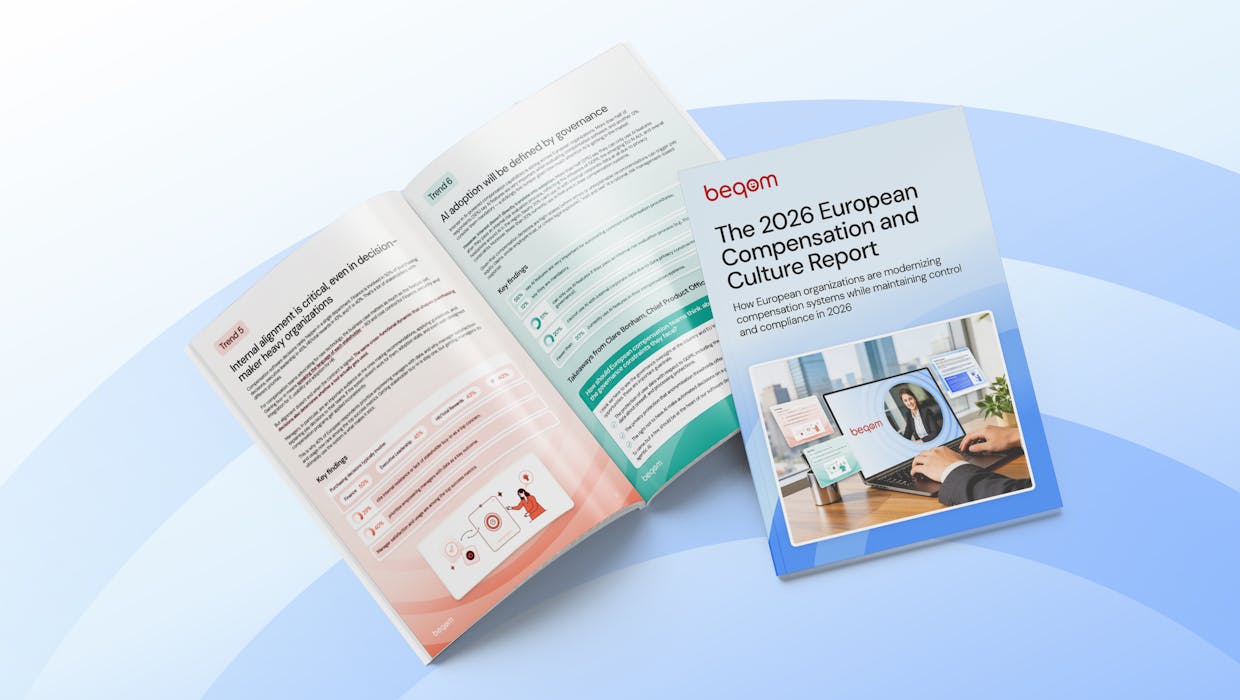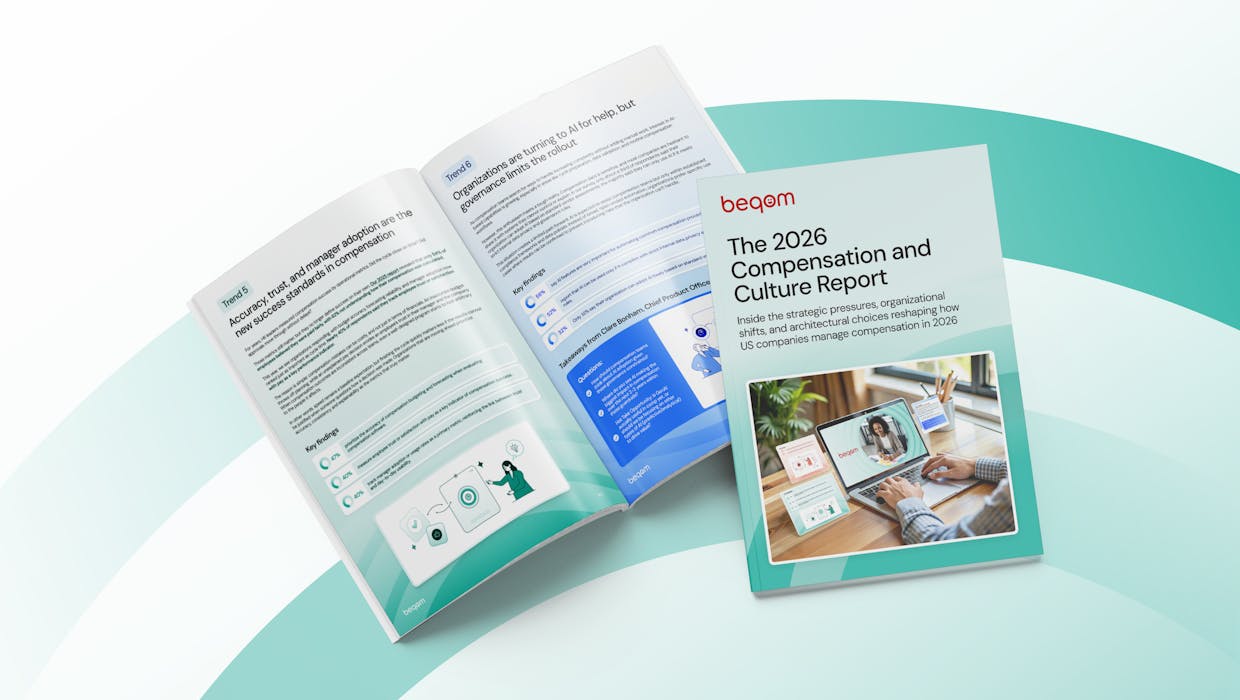A Complete Guide to Compensation Reviews

Learn more about the following beqom products
What is a compensation review?
A compensation review is a systematic process where organizations evaluate and adjust employee salaries, benefits, and overall pay packages to reflect performance, market trends, and internal equity. This ensures that compensation remains fair, competitive, and aligned with the company’s strategic goals.
Often conducted annually during the Year End Review, or in response to promotions or significant market changes, compensation reviews are critical for retaining talent, improving employee satisfaction, and addressing equity concerns. Companies using advanced compensation management software can streamline this process, ensuring consistency and precision in decision-making.
To learn more about how compensation strategies contribute to broader workforce management, check out our article on compensation management.
Why do we pay people?
Compensation is much more than just paying employees for their work. It’s a strategic tool that serves multiple purposes:
- Attracting talent: Competitive salaries and benefits help organizations stand out in a competitive job market.
- Retaining employees: Transparent and fair pay structures reduce turnover by fostering loyalty and satisfaction.
- Motivating performance: By linking compensation to measurable goals, companies incentivize employees to perform at their best.
- Ensuring equity: Thoughtful pay structures promote fairness across roles, levels, and demographics, supporting an inclusive workplace.
Compensation also reflects a company’s philosophy and values, playing a critical role in shaping its reputation as an employer. By leveraging tools like compensation management software, organizations can align pay structures with their broader goals.
How to run a successful compensation review
Preparing for a compensation review
Preparation is key to ensuring a fair and effective compensation review. Start by defining clear objectives:
- Are you rewarding performance?
- Are you addressing internal pay equity issues?
- Do you aim to align with market trends?
Conduct a job analysis to understand the responsibilities, skill requirements, and impact of each role. Use salary data from benchmarking tools to compare compensation with industry standards. Learn more about aligning pay with market benchmarks in our article on compensation management.
Aligning stakeholders
Effective collaboration among HR, management, and finance is essential. Aligning these stakeholders on goals, budgets, and processes ensures consistency and prevents conflicts.
Setting a budget and benchmarks
Establishing a budget is critical to balance employee expectations with organizational resources. Using market benchmarking tools, organizations can set competitive salary ranges while staying within budget.
Conducting performance and market analysis
Performance reviews provide a foundation for salary adjustments. Incorporating talent calibration techniques ensures consistent evaluation across teams. Combining performance data with external market analysis strengthens decision-making, ensuring pay decisions are both fair and competitive. For insights into improving performance evaluations, check out our guide on talent calibration.
Communicating compensation adjustments
Transparency is critical when sharing compensation decisions. Provide employees with detailed compensation review statements that explain salary changes and the rationale behind them. Clear communication builds trust and reinforces the company’s commitment to fairness.
Common approaches to compensation reviews
Performance-based compensation reviews
This approach ties salary increases and bonuses directly to individual or team performance. Metrics such as meeting sales targets or delivering successful projects are often used to determine adjustments.
Market-based compensation reviews
Market-based reviews focus on aligning salaries with industry standards and regional trends. By analyzing salary surveys and market reports, organizations can remain competitive and attract top talent.
Combining performance and market factors
Many organizations adopt a hybrid approach that blends performance-based and market-based reviews. This ensures that pay adjustments are both internally equitable and externally competitive, addressing both employee contributions and market conditions.
Key challenges in the compensation review
Staying within budget
Compensation reviews often require balancing limited resources with employee expectations. Companies can leverage compensation management software to track budgets in real-time and avoid overspending.
Ensuring fairness and equity
Achieving equity involves addressing systemic pay gaps and ensuring consistency across roles. Tools like Equity Bonus frameworks can help organizations correct disparities and promote fairness. Learn more about implementing equity-focused strategies in our article on Equity Bonus options and processes.
Handling multiple stakeholders
Managing input from HR, finance, and department heads can complicate the process. Establishing clear workflows and utilizing flexible approval procedures ensures smoother collaboration.
Key system capabilities for salary reviews
Manager self-service tools
Modern compensation management software includes self-service tools that empower managers to access salary data, recommend adjustments, and track approvals in real time.
Tracking budgets in real-time
Budget tracking tools ensure that compensation decisions stay within financial constraints, enabling organizations to make informed decisions without risking overspending.
Flexible approval processes
Customizable workflows simplify collaboration among stakeholders, ensuring timely and consistent compensation adjustments.
Global considerations for salary administration
Managing multiple currencies and languages
Global organizations must account for currency fluctuations and regional languages when administering compensation. Using tools with multi-currency and multi-language capabilities ensures smooth, error-free reviews.
Localizing global compensation frameworks
Tailoring global policies to reflect local regulations, cultural expectations, and market conditions is essential. Localization ensures compliance while fostering trust and satisfaction among employees.
Best practices for an effective compensation review
- Benchmark regularly: Regularly compare your pay structures with industry standards to maintain competitiveness.
- Leverage technology: Use compensation management software to automate processes, reduce errors, and improve accuracy.
- Emphasize transparency: Share clear criteria for compensation decisions and communicate openly during reviews.
- Address equity proactively: Conduct pay audits and take steps to close gaps, ensuring fairness across the organization.
For additional tips on improving performance and employee satisfaction, explore our guide on the Year End Review.
Conclusion: Building a fair and transparent compensation review process
Compensation reviews are not just administrative tasks—they are strategic opportunities to align employee rewards with organizational goals. By leveraging tools like compensation management software and following best practices, companies can build fair, transparent systems that motivate employees and support long-term success.
A well-executed compensation review fosters trust, promotes equity, and ensures competitiveness in a dynamic job market.
Ready to take your compensation review process to the next level? Contact beqom today to discover how our Total Compensation Management solution can help you streamline salary reviews, enhance fairness, and achieve your organizational goals. Get in touch with us here.
Frequently Asked Questions
What is a compensation review for employees?
A compensation review assesses employee pay and benefits to ensure alignment with performance, market benchmarks, and organizational goals.
What is a compensation review statement?
A compensation review statement is a formal document outlining salary changes and the reasons behind those adjustments, promoting transparency.
What do you say in a compensation review meeting?
Discuss performance feedback, explain how salary decisions were made, and address any concerns the employee may have.
What is a comp review at work?
A comp review (short for compensation review) evaluates an employee’s pay in relation to their performance, role, and external market trends to ensure fairness and equity.







